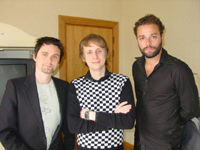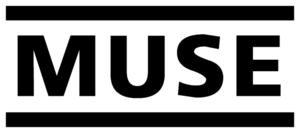Difference between revisions of "Muse"
(i think we need some sort of biography on the muse page. this was the best i could do) |
(No difference)
|
Revision as of 16:24, 6 January 2009
Muse members
Matthew Bellamy (vocals, guitar, keyboard, piano, keytar, lyrics)
Christopher Wolstenholme (bass, backing vocals, keyboard, guitar)
Dominic Howard (drums, percussion, human bones, synthesiser)
Live performance only members
Formation
- for a full biography see Biography
The members of Muse played in separate bands during their stay at Teignmouth Community College and Coombeshead College in the early 1990s. The formation of Muse began when Bellamy successfully auditioned for the part of guitarist in Dominic Howard's band. They asked Chris Wolstenholme, who played drums at the time, to learn to play bass guitar for the band. Wolstenholme agreed and took up lessons.
In 1994, under the name Rocket Baby Dolls and with a goth/glam image, the group won a local battle of the bands contest, smashing their equipment in the process. "It was supposed to be a protest, a statement", Bellamy said, "so, when we actually won, it was a real shock. A massive shock. After that, we started taking ourselves seriously". Shortly after the contest, the three decided to forego university, quit their jobs, change the band name to Muse, and move away from Teignmouth.
The band name
The band have stated that they chose the name Muse due to it being short as well as looking good on gig posters. Muse also chose the name after hearing in art class (Muses) and then they looked it up in the dictionary and said something like 'well there's a 'muse' going around town right now' or something and they became Muse! Back to you Tom - The actual meaning of the word is to be in thought for a long time. Alternatively, a muse in Greek culture was an abstract mythological being that gave inspiration to artists and authors. There were nine Muses in Greek religion, all of which were Zeus's daughters. Of the Muses, Matthew Bellamy's favourite is Erato,[1] the Muse of lyrical and erotic poetry.
The first time the band heard of the word was when someone in Muse's home town, Teignmouth, suggested that the reason for a lot of the populace becoming members of bands was due to a muse hovering over the town.[2]
The band name was made a Trade mark by Matthew Bellamy and his solicitors on 21st July 1999. The Trade mark covers three different classes:
- Class 09:
Magnetic tapes, compact discs, recording discs, mini discs, cassettes, records, video discs and video tapes, sound recordings, video recordings, CD-ROM discs, DVDs, all featuring music by, musical and/or visual performances by and/or information relating to recording and performing artists.
- Class 25:
Clothing, footwear and headgear.
- Class 41:
Production of shows and presentations and live performances relating to recording and performing artists; recording services provided by recording and performing artists; theatrical productions and audio programming for recording and performing artists; stage, screen, television, concert and nightclub entertainment services relating to recording and performing artists.
Previous names
Muse management
Museboard management
References
- ↑ Robin Bresnark. (1999-12). The Potholey Bible. Melody Maker. Retrieved from Crikey. Need a domain here, kthnxbye. [verify]
- ↑ ninemsn 200702




